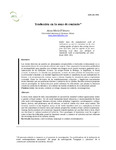
Please use this identifier to cite or link to this item:
http://ricaxcan.uaz.edu.mx/jspui/handle/20.500.11845/1029Full metadata record
| DC Field | Value | Language |
|---|---|---|
| dc.contributor | 253008 | es_ES |
| dc.creator | D´Amore Wilkinson, Anna Maria | - |
| dc.date.accessioned | 2019-05-28T20:13:14Z | - |
| dc.date.available | 2019-05-28T20:13:14Z | - |
| dc.date.issued | 2010 | - |
| dc.identifier | info:eu-repo/semantics/publishedVersion | es_ES |
| dc.identifier.issn | 2011-799X | es_ES |
| dc.identifier.uri | http://ricaxcan.uaz.edu.mx/jspui/handle/20.500.11845/1029 | - |
| dc.description | Literary texts cannot be fully comprehended or successfully rendered without appreciation within a greater cultural context. An all-round humanities-based education is recommendable for those who work with languages between cultures, where philology, linguistics, sociolinguistics, cultural theory, history, and philosophy are all relevant, as well as studies of a more social nature. The diversity inherent to the linguistic reality of the world manifests itself in a multiplicity of forms and the coexistence of diverse races and cultures propels the creation of new cultural expressions. Among the by-products of cultural and linguistic transformations we can find literary texts which are the direct or indirect product of hybridity. New paradigms of translation must be sought in order to face the difficulties posed by literature created in contexts of hybridity and not obliterate the revealing marks of its cultural identity. | es_ES |
| dc.description.abstract | Los textos literarios no pueden ser plenamente comprendidos o traducidos exitosamente sin su apreciación dentro de un contexto cultural más amplio. Una preparación humanística polifacética es recomendable para aquellos que trabajen con lenguas en el común escenario generado por el intercambio de las diferentes culturas, un campo donde la filología, la lingüística, la teoría cultural, la historia y la filosofía son pertinentes, además de otros estudios de naturaleza social. La diversidad inherente a la realidad lingüística del mundo se manifiesta en una multiplicidad de formas, y la coexistencia de diversas razas y culturas impulsa la creación de nuevas expresiones culturales. Entre los derivados de las transformaciones culturales y lingüísticas encontramos textos literarios que son productos directos o indirectos de la hibridez. Resulta necesario proponer nuevos paradigmas de traducción para poder enfrentar las dificultades que plantea la literatura creada en contextos de hibridez y no obliterar las huellas reveladoras de su identidad cultural. | es_ES |
| dc.language.iso | spa | es_ES |
| dc.publisher | Universidad de Antioquia | es_ES |
| dc.relation.uri | generalPublic | es_ES |
| dc.rights | Atribución-NoComercial-CompartirIgual 3.0 Estados Unidos de América | * |
| dc.rights.uri | http://creativecommons.org/licenses/by-nc-sa/3.0/us/ | * |
| dc.source | Mutatis Mutandis Revista Latinoamericana de Traducción, Vol. 3, No 1, 2010. | es_ES |
| dc.subject.classification | HUMANIDADES Y CIENCIAS DE LA CONDUCTA [4] | es_ES |
| dc.subject.other | traducción | es_ES |
| dc.subject.other | cambios de código | es_ES |
| dc.subject.other | lenguas en contacto | es_ES |
| dc.subject.other | sociolingüística | es_ES |
| dc.subject.other | translation | es_ES |
| dc.subject.other | code-switching | es_ES |
| dc.subject.other | languages in contact | es_ES |
| dc.subject.other | sociolinguistics | es_ES |
| dc.title | Traducción en la zona de contacto | es_ES |
| dc.type | info:eu-repo/semantics/article | es_ES |
| Appears in Collections: | *Documentos Académicos*-- UA Estudio de las Humanidades | |
Files in This Item:
| File | Description | Size | Format | |
|---|---|---|---|---|
| TraduccionEnLaZonaDeContacto.pdf | 376,84 kB | Adobe PDF |  View/Open |
This item is licensed under a Creative Commons License
